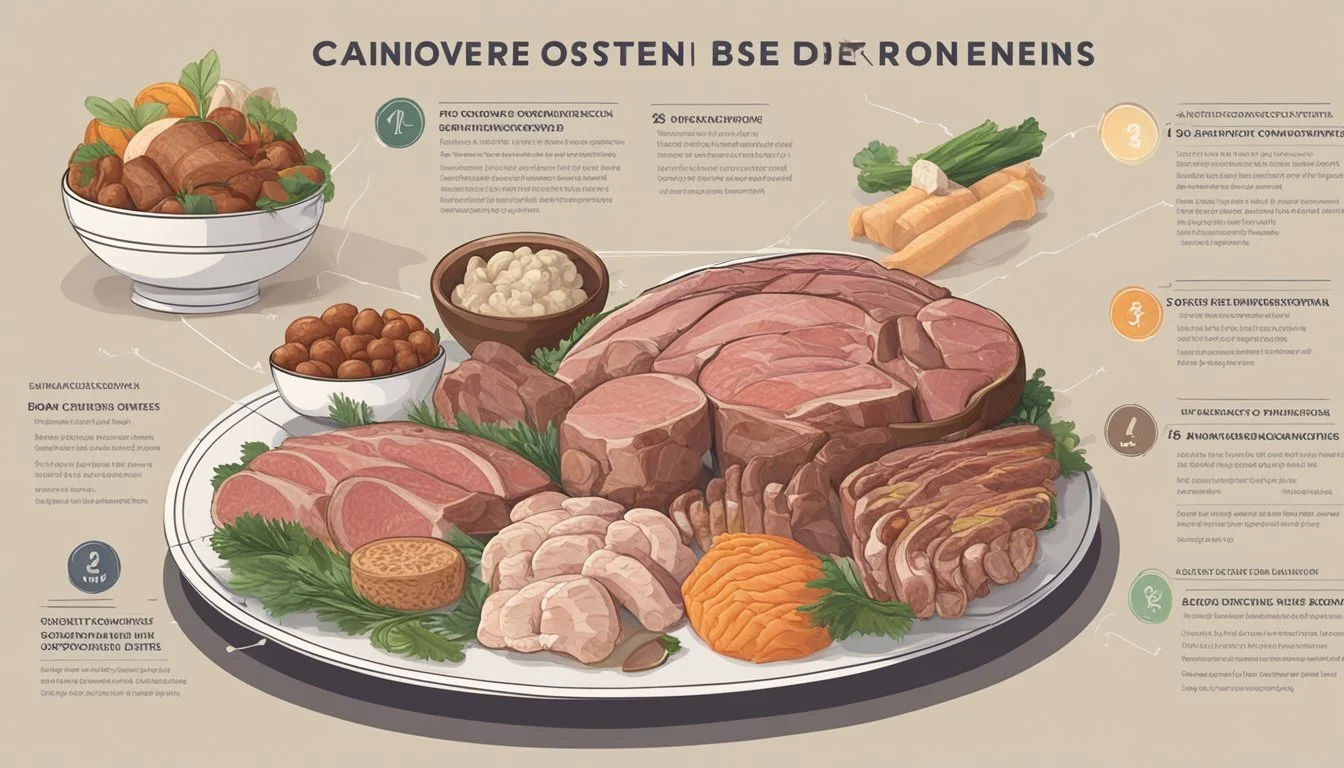Carnivore Diet and the Role in Preventing Osteopenia
Unveiling the Connection
The Carnivore Diet, one centered around the exclusive consumption of animal products, is gaining attention for its potential impact on various aspects of health, including bone density. The diet posits that high protein intake from animal sources can contribute positively to bone health. Protein is a crucial component of bone, and diets rich in this macronutrient have been shown to support bone maintenance and growth, which is particularly relevant when considering conditions like osteopenia—a precursor to osteoporosis characterized by lower than normal bone mineral density (BMD).
Amidst discussions on dietary patterns that promote bone health, the Carnivore Diet's emphasis on animal protein presents a stark contrast to plant-based approaches. While some studies imply that a vegetarian diet may affect bone mineral density due to potential nutrient deficiencies, the Carnivore Diet suggests that its high-protein, nutrient-dense animal products could offer a protective effect. It's crucial to evaluate such dietary strategies holistically, considering factors like calcium and vitamin D intake, as these nutrients play a pivotal role in bone health.
As individuals and medical professionals explore lifestyle choices that mitigate the risk of osteopenia, the intersection of diet and bone health remains a key area of focus. Assessing the Carnivore Diet's role involves understanding the nuances of nutrient absorption and the biological processes that contribute to robust bone structure. While preliminary accounts and studies provide some support for the diet's benefits, comprehensive research and personalized medical advice are essential for those considering the Carnivore Diet as a preventative measure against bone mineral loss.
Understanding Osteopenia
Osteopenia is a key precursor to osteoporosis, characterized by lower than normal bone mineral density (BMD), a stage where intervention is crucial to prevent further bone loss and increased fracture risk.
The Pathophysiology of Bone Loss
Bone density loss, medically termed as osteopenia, occurs when bones lose minerals, such as calcium, more quickly than the body can replace them, leading to a decrease in bone strength. It is a result of an imbalance in the bone remodeling process—where osteoclasts (cells that break down bone tissue) outpace osteoblasts (cells that build up bone). Bone turnover markers can help in understanding the rate of bone remodeling, indicating risk levels for osteopenia.
Risk Factors and Prevalence
The risk of developing osteopenia increases with age and is significantly common in women post-menopause due to a drop in estrogen levels. Lifestyle factors such as excessive alcohol intake and smoking can accelerate bone loss. Additionally, vitamin D deficiency exacerbates the situation, given its role in calcium absorption and bone health. A lack of adequate physical activity and poor nutrition contribute to lowered BMD.
Diagnosing Osteopenia
Osteopenia is diagnosed through a painless screening measure called a DEXA scan (Dual-Energy X-ray Absorptiometry). This scan compares an individual's bone mineral content to an established normal reference, resulting in a T-score. Fracture risk increases as the T-score decreases from a normal bone density (-1.0 and above) towards osteoporosis (-2.5 and below). Regular screenings can be critical for early detection, especially in individuals with risk factors.
Fundamentals of the Carnivore Diet
This section examines the essential aspects of the Carnivore Diet, from its strict adherence to animal-sourced foods to the key inclusions that make up its nutritional profile.
Definition and Dietary Restrictions
The Carnivore Diet is an eating plan that involves consuming exclusively animal products. It excludes all forms of plant-based foods, which means no vegetables, fruits, grains, nuts, seeds, or legumes. This diet is characterized by a high intake of proteins and fats, while being virtually carb-free and fiberless due to the absence of plant matter.
Primary Food Sources in Carnivore Diet
The diet hinges on several core food groups:
Meat: Beef, pork, lamb, venison, and other game meats form the cornerstone of the diet.
Fish: A variety of fish, such as salmon and mackerel, offer essential Omega-3 fatty acids.
Eggs: High in protein and nutrients, eggs are a versatile component of this diet.
Dairy Products: Select dairy like butter and hard cheeses may be included for fats and flavor; however, some adherents prefer to limit or avoid dairy.
It's important to note that processed meats with additives or cured with sugar are generally discouraged to maintain the diet's focus on whole, nutrient-dense foods.
Nutritional Considerations
When exploring the carnivore diet's role in preventing osteopenia, it's important to examine specific nutrients that can influence bone health. The diet's macronutrient composition, its vitamins and minerals profile, and potential deficiencies should be thoroughly understood.
Macronutrient Composition
The carnivore diet is composed predominantly of animal products, emphasizing a high intake of protein and fat, especially saturated fat, while eliminating carbohydrates. Protein is crucial for bone structure, while fats provide the necessary energy and aid in the absorption of fat-soluble vitamins. However, the absence of carbohydrates means a lack of dietary fiber and phytochemicals, which traditionally play various roles in overall health.
Vitamins and Minerals
Vitamins and minerals are integral to bone health. The carnivore diet often provides ample amounts of vitamin B12, zinc, and vitamin K2, all of which are present in animal products and important for bone formation and density.
Calcium: Required for bone strength, typically found in dairy products which may or may not be included in a person's carnivore diet preference.
Vitamin D: Essential for calcium absorption, it can be synthesized through sun exposure but is also present in fatty fish and egg yolks.
Other beneficial minerals for bone health that can be obtained through the carnivore diet include magnesium, sodium, potassium, and fatty acids, especially omega-3s.
Enjoy the convenience of doorstep delivery when you buy calcium and vitamin D online!
Potential Deficiencies in Carnivore Diet
A strict carnivore diet may lead to deficiencies in certain nutrients vital for preventing osteopenia, as it excludes plant-based food sources. The lack of calcium and vitamin D can be of particular concern if dairy and certain fatty fish are not consumed. Moreover, the absence of plant-sourced fiber and phytochemicals may influence overall gastrointestinal health and broader nutritional balance.
Fiber: Not present in animal foods; important for gut health and can affect overall nutrient absorption.
Phytochemicals: Compounds in plants that can contribute to bone health and are not found in the carnivore diet.
Adherents must ensure a varied intake of animal products to cover their dietary needs and might require targeted supplementation to address these gaps, especially for calcium and vitamin D.
Impact on Bone Health
The carnivore diet, which emphasizes the consumption of animal products, offers significant amounts of protein that can influence bone mineral density and bone metabolism. However, the diet's impact on calcium intake and bone formation is a critical aspect of its role in the prevention of osteopenia.
Effects of Carnivore Diet on Bone Mineral Density
Bone mineral density (BMD) is a critical indicator of bone strength and overall bone health. The carnivore diet's high levels of dietary protein may contribute positively toward BMD by providing the necessary components for bone maintenance and repair. Yet, without adequate intake of other nutrients that support bone health, such as calcium and vitamin D, the effects may not be optimal for preventing conditions like osteopenia.
Protein Intake and Bone Metabolism
Bone metabolism involves a delicate balance of bone formation and bone resorption. Dietary protein is essential in maintaining this balance, known as bone homeostasis, and thus supports overall bone health. The carnivore diet offers an abundance of protein, potentially aiding the body in preserving and enhancing bone structure. It is important for individuals on this diet to ensure the protein consumed is balanced with nutrients that aid in calcium absorption and bone formation.
Calcium Intake and Bone Formation
Calcium plays a pivotal role in bone formation and homeostasis. While the carnivore diet provides high protein levels beneficial for bones, it may lack other nutrients, particularly calcium, which is often found in plant-based foods or dairy products typically excluded in a strict carnivore regimen. Individuals on the carnivore diet should consider their calcium sources carefully or explore supplementation options to prevent potential negative impacts on bone health associated with insufficient calcium intake.
Comparative Analysis
This section presents a detailed comparative analysis focusing on the carnivore diet and its potential role in preventing osteopenia compared to omnivorous and vegetarian or vegan diets, examining diverse dietary inputs and their implications for bone health.
Carnivore vs. Omnivorous Diets
The carnivore diet consists exclusively of animal products and excludes plant-based foods like vegetables, fruit, grains, nuts, legumes, and whole grains. In contrast, an omnivorous diet includes both plant-based foods and animal products. Key nutrients for bone health such as calcium and vitamin D are found in dairy products, which are consumed in both dietary patterns. However, the exclusion of plant-based foods in the carnivore diet means omitting dietary sources of other important nutrients that support bone health, including potassium and magnesium found in fruits and vegetables. On the other hand, some evidence suggests that certain animal proteins might increase calcium absorption.
Carnivore vs. Vegetarian and Vegan Diets
Vegetarian and vegan diets avoid or entirely exclude animal products. They are typically rich in vegetables, fruit, grains, nuts, legumes, and whole grains, which can provide essential nutrients like calcium, potassium, magnesium, and vitamin K that are vital for maintaining bone mineral density. The carnivore diet, by eliminating these plant-sourced nutrients, might pose a challenge for osteopenia prevention unless there is careful selection of nutrient-dense animal products and, potentially, the use of supplements. Vegetarians may still consume dairy, which provides calcium and vitamin D, but vegans must seek fortified foods or supplements to obtain adequate vitamin D and calcium levels.
Preventative Strategies
Preventing osteopenia involves a multifaceted approach that includes proper nutrition and positive lifestyle choices. Addressing these aspects can help maintain bone density and overall bone health.
Dietary Approaches to Preventing Osteopenia
A diet that is rich in essential nutrients is fundamental to bone health. The carnivore diet, which is predominantly based on animal products, may provide protein and certain minerals that are crucial for bone maintenance. However, those following this diet should be aware of potential nutritional deficiencies. Key dietary considerations include:
Calcium and Vitamin D: These nutrients are vital for bone health. Individuals on a carnivore diet can obtain calcium from dairy products, if included, and bone meal supplements. Vitamin D can be acquired from fatty fish and by ensuring adequate sunlight exposure.
Adequate Protein Intake: Animal products are naturally high in protein, which is essential for bone mass. Care should be taken to consume lean meats to minimize saturated fat intake.
Balanced Nutrition: Although the carnivore diet may provide certain macronutrients, it is restrictive by nature. Individuals should consider incorporating a variety of nutrient-dense foods, such as vegetables and fruits, if they are not strictly adhering to a carnivore diet, to prevent nutritional gaps.
Lifestyle and Behavioral Factors
Lifestyle choices play a significant role in the prevention of osteopenia:
Regular Physical Activity: Weight-bearing exercises such as walking, running, and strength training are beneficial in maintaining bone density.
Avoiding Excess Alcohol and Smoking: Both alcohol and smoking have been linked to bone loss. It is advised to limit alcohol intake and avoid smoking.
Monitoring Caffeine, Sugar, and Salt: Consuming these in moderation is important as excessive intake can contribute to bone depletion.
Weight Management: Maintaining a healthy weight is critical, as both underweight and obesity can negatively impact bone health.
Implementing these strategies can greatly reduce the risk of developing osteopenia and promote overall well-being.
Case Studies and Clinical Evidence
The exploration of the carnivore diet's impact on bone health is encapsulated within the current body of research and documented patient outcomes from clinical trials.
Research on the Carnivore Diet and Bone Health
In evaluating the carnivore diet's role in preventing osteopenia, some clinical evidence points to potential benefits in bone health. The diet, consisting exclusively of animal products, has been thought to provide high levels of protein and essential nutrients related to bone maintenance. Clinical case studies have noted that groups with animal-based diets, like Arctic and nomadic societies, exhibited bone health resilience despite the absence of plant-based foods. Nonetheless, these observations require a contemporary clinical framework to assess relevancy to modern diets.
Bone mineral content and hip fracture rates have traditionally been the focus of mainstream dietary studies, with a significant emphasis on the intake of calcium-rich plant foods. However, a shift towards evaluating the carnivore diet introduces debates over its acid load and potential risk of metabolic acidosis, which could affect mineral status. Despite sparse direct research linking the carnivore diet to improvements in bone health, bioavailable nutrients from animal products like calcium and vitamin D remain critical to bone health, as seen in the robustness of the lumbar spine in studied populations.
Patient Outcomes and Clinical Trials
Limited but growing, the patient outcomes reported from clinical trials exploring the carnivore diet suggest an anecdotal satisfaction with diet adherence and perceived health benefits. For instance, some participants have reported improved markers of bone health following a strict carnivore regimen with no significant adverse effects compared to expected norms. Such outcomes, although not yet statistically significant due to the low number of controlled trials, potentially reflect a relationship between the diet and bone mineral content maintenance.
Trials have yet to establish a definitive correlation between the carnivore diet and the prevention of osteopenia or the improvement of bone health in a statistically robust manner. However, the scientific community continues to monitor the patient outcomes resulting from this dietary approach, particularly in how it might reduce the risk or slow the progression of diseases associated with bone density, such as osteoporosis, notably in the hip and lumbar spine areas.
Controversies and Misconceptions
Exploring the carnivore diet and its connection to osteopenia reveals various controversies and misconceptions. This section breaks down the prevalent criticisms and erroneous beliefs associated with these topics.
Common Criticisms of the Carnivore Diet
The carnivore diet, which consists predominantly of animal products, faces scrutiny regarding its long-term health impacts. Critics often cite the following points:
Processed Meats: High intake of processed meats in some interpretations of the carnivore diet raises concerns due to potential links with chronic diseases such as cancer and heart disease.
Saturated Fats: The diet's emphasis on meat, which often contains higher levels of saturated fats, is frequently questioned. High saturated fat intake has been associated with an increased risk of heart disease.
Concerns also extend to dietary deficiencies that might arise due to the exclusion of plant-based foods, leading to discussions about balanced nutrition and the role of dairy products in providing essential nutrients.
Misconceptions About Osteopenia and Diet
Osteopenia is a condition characterized by lower than normal bone density, which presents a heightened risk for osteoporosis. Dietary misconceptions include:
Dairy Requirement: It is often believed that dairy products are essential for bone health; however, bone density can be affected by various factors, including physical activity and obesity.
Carnivore Diet and Inflammation: A misconception exists that the carnivore diet inherently leads to increased inflammation, a risk factor for osteopenia. Yet, some argue that removing plant-based foods, which can contain inflammatory agents for some individuals, may potentially decrease inflammation.
Regarding osteopenia risk factors, it is essential to recognize that lifestyle choices such as alcohol consumption and physical activity levels play significant roles. The diet itself should not be viewed in isolation.
Conclusion
Adherence to a carnivore diet may influence bone health, particularly in the context of preventing osteopenia. The cornerstone of this diet—high protein intake from animal sources—supports bone structure and function. Key nutrients such as calcium and vitamin D, essential for maintaining bone density, are available through this diet. Nonetheless, a monodiet like the carnivore diet can lead to deficiencies in other critical bone-supporting nutrients found in plant-based foods.
A balanced dietary intake incorporating a wide variety of nutrients is advisable for bone health. Individuals considering the carnivore diet should be aware that preventative measures may be necessary to counter potential nutritional gaps. These measures should ensure adequate levels of bone-critical micronutrients, often enhanced by a diverse diet.
When contemplating any dietary pattern for health outcomes such as preventing osteopenia, the inclusion of a broad spectrum of foods might provide a more protective effect against bone mineral loss. Integrating medical guidance with nutritional expertise can aid in establishing a regimen that safeguards against nutrient deficiencies and promotes overall skeletal health.
In sum, while the carnivore diet provides significant protein and can be beneficial for bone health, a cautious approach is crucial. Tailoring the diet to include sources of all necessary nutrients, possibly through supplementation or strategic dietary choices, may offer a more holistic approach to preventing osteopenia.








